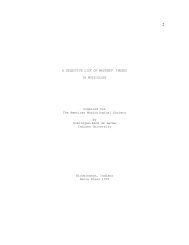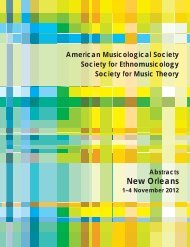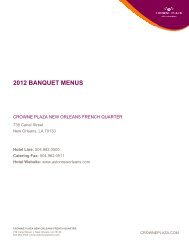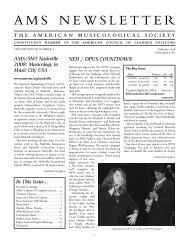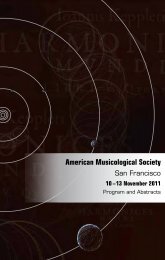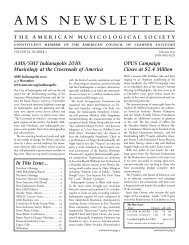AMS Philadelphia 2009 Abstracts - American Musicological Society
AMS Philadelphia 2009 Abstracts - American Musicological Society
AMS Philadelphia 2009 Abstracts - American Musicological Society
Create successful ePaper yourself
Turn your PDF publications into a flip-book with our unique Google optimized e-Paper software.
80 Friday afternoon <strong>AMS</strong> <strong>Philadelphia</strong> <strong>2009</strong><br />
Men AnD Music<br />
Alexandra Amati-camperi, university of san francisco, chair<br />
THE GIUSTINIANA AS EVERYDAY PRACTICE:<br />
MALE CONVIVIALITY IN VENETIAN LIFE<br />
Shawn Keener<br />
University of Chicago<br />
From the 1560s on, three-voice polyphonic works called giustiniane or veneziane were published<br />
alongside other genres, in anthologies of their own, and in madrigal comedies. Scholars<br />
have interpreted the flurry of giustiniane published in the 1560s and 1570s as gestures of local<br />
musical pride. In this line of thinking, the publication of these dialect works not only<br />
had appeal to Venetians owing to the genealogy of the giustiniana rubric (traceable to the<br />
fifteenth-century Venetian poet Leonardo Giustinian), as well as to a roster of Venetian composers,<br />
but also paid homage to a vigorous musical past—a past worthy of commemoration,<br />
particularly in the wake of Willaert’s death and the subsequent ascendancy of Venetians to<br />
positions of power in local musical circles.<br />
This paper recognizes the importance of local appeal to pieces collected as “giustiniane”<br />
but argues from new networks of primary texts, prints, documents, and authors that the<br />
late-sixteenth-century genre represented inseparably gestures of civic pride and expressions of<br />
convivial relationships, defined through performative idioms. These networks range over the<br />
different genres of dialect literature, theater, and vernacular song, some printed and circulated<br />
as commodities in book markets and others confined to manuscript. The resulting entity was<br />
sometimes an ephemeral performance and sometimes a written score (still extant or not). In<br />
either case, it invariably represented an extension of a practice deeply embedded in a culture<br />
of convivial that united poetry, theater, and music along with conversation, intellectual pursuits,<br />
and games.<br />
Combining this new evidence with the results of a few recent studies, mainly literary, I<br />
cast the playful intertextuality indigenous to the late-cinquecento giustiniana in a new light.<br />
The “fellowships of discourse” established among literary men of sixteenth-century Venice<br />
were built through the exchange of dialect poetry, whose language and ribald subjects marked<br />
these men as insiders and helped them form social bonds. The play of public and private so<br />
characteristic of these fellowships is set in high relief by the anonymous publication of works<br />
by members of Domenico Venier’s academy in the dialect anthologies La caravana (1565) and<br />
Versi alla venitiana (1613). The extensive web of textual concordances I have discovered in and<br />
around the giustiniana repertoire locate it at the ephemeral edge of this long-lived tradition,<br />
where the lightest dialect verse slips easily into comic portrayals of venezianità in the guise of<br />
the Venetian Magnifico or Pantalone.<br />
I will demonstrate how these threads converge by taking as a case study the Libro secondo<br />
delle giustiniane of 1575 by the Trevisan composer Giuseppe Policreti (c. 1548–1623). Drawing<br />
on the writings of the his lifelong friend, the physician, writer, and social-climber Bartholomeo<br />
Burchelati, including correspondence between the two, I will argue that the Libro secondo<br />
betrays an interest in Venetian literary and social “fellowships of discourse” on the part of the<br />
young composer and his circle.



